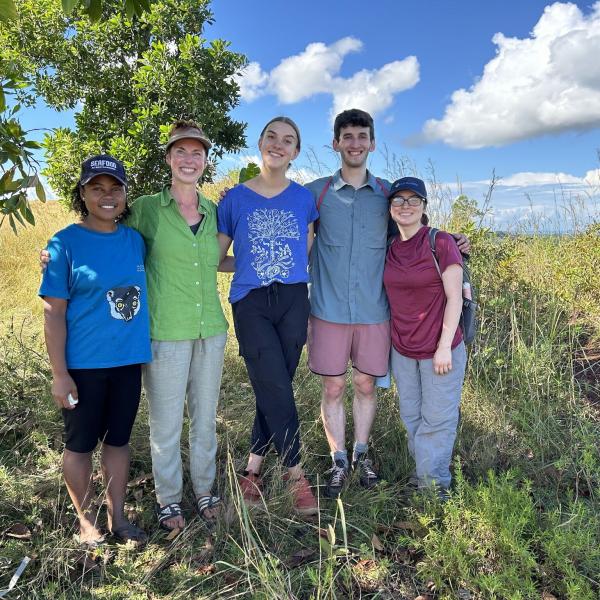On Oct. 18, Erik Herzog, professor of biology, was installed as the Viktor Hamburger Distinguished Professor in Arts & Sciences. The program included welcoming remarks by Dean Feng Sheng Hu, the Lucille P. Markey Distinguished Professor; an introduction by Jonathan Losos, the William H. Danforth Distinguished University Professor; and the installation and medallion presentation by Provost and Executive Vice Chancellor Beverly R. Wendland.
At the beginning of his installation talk, titled “For Whom the Bells Toll: Networked Circadian Clocks and Clock Watchers,” Herzog took a moment to thank the family of Viktor Hamburger and note how “remarkable and clearly well-loved” the former professor was at Washington University.
“I really appreciate the chance to be honored with Viktor Hamburger’s name,” Herzog said. “Viktor gave us the Department of Biology that we now know at Washington University and really created a community here that celebrates people that come from diverse backgrounds and wants people to challenge dogma in the field.”
About Erik Herzog
Erik Herzog is a leading chronobiologist, studying the molecules, cells, and circuits that underlie daily rhythms in physiology and behavior. He studied biology and Spanish as an undergraduate at Duke University and neuroscience as a graduate student with Robert Barlow at Syracuse University. He did postdoctoral research with Gene Block at the University of Virginia.
In 2000, Herzog started his lab at Washington University. The lab has discovered mechanisms underlying how circadian clocks regulate physiology, behavior, and health. Current projects aim to identify the neural code used by neurons to release neuropeptides that synchronize circadian cells, test the role of maternal and fetal circadian tissues in timing birth, and map the connections and cell types that underlie daily rhythms as a function of age, sex, and seasons. Supported by grants from agencies including the National Institutes of Health and the March of Dimes, the lab has published over 100 peer-reviewed articles.
Herzog has been recognized with teaching and mentoring awards and served as the President of the Society for Research on Biological Rhythms, the Co-Director of the WashU Neuroscience Graduate Program, and the Director of the ENDURE program, a NIH-funded initiative to increase diversity in the neurosciences.
About Viktor Hamburger
Viktor Hamburger, a leading experimental embryologist, had a long, distinguished career at Washington University, from 1935 until his death in 2001, one month shy of his 101st birthday. Washington University created this professorship in 2006 to honor him for his many accomplishments.
Born in the small town of Landeshut (now Kamienna Gora, Poland) in Silesia, Germany, Viktor Hamburger attended the universities of Breslau, Heidelberg, Munich, and Freiburg. At the University of Freiburg, he earned a doctorate in zoology in 1925 under the direction of renowned biologist and Nobel laureate Hans Spemann. There he began his study of the embryonic nervous system, which became his life’s work.
In 1932, he joined Frank R. Lillie’s laboratory at the University of Chicago, where he studied chicken embryology. While in Chicago, he was removed from his faculty position in Germany because of his Jewish ancestry. He chose to remain in the United States and joined the Washington University faculty in 1935 as assistant professor of zoology. He quickly advanced to full professor and biology department chair, a position he held for 25 years. He was appointed the Edward Mallinckrodt Distinguished University Professor in 1968 and became an emeritus professor in 1969. He maintained an active, well-funded research program through the 1980s.
Professor Hamburger’s research included landmark contributions to the fields of experimental embryology and neuroembryology and the study of programmed cell death. His work with colleague Rita Levi-Montalcini resulted in the discovery of naturally occurring neuronal death, and his collaboration with Levi-Montalcini and biochemist Stanley Cohen resulted in the discovery of nerve growth factor — research that earned professors Levi-Montalcini and Cohen a Nobel Prize in physiology or medicine in 1986.
Washington University honored Professor Hamburger with a Distinguished Faculty Award at Founders Day in 1962, and he received the Search award from the William Greenleaf Eliot Society in 1989. A member of the National Academy of Sciences and the American Academy of Arts & Sciences, he was awarded honorary degrees from Washington University, University of Uppsala (Sweden), and Rockefeller University.



